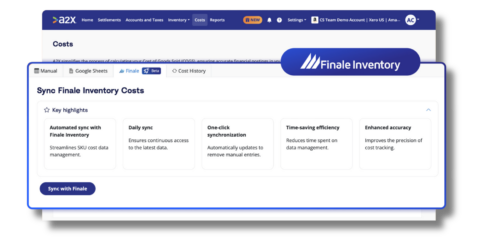From its inception, Finale’s great strength has been inventory management. With our latest updates to enable invoicing for order management, Finale has now also become an outstanding order management system for small businesses. A capable order management system must include support for product information, inventory availability, suppliers and reordering, customers and pricing and orders and returns handling. Additionally, support for packing and shipping, invoicing and data analysis and reporting is also essential.
Today’s invoicing software update completes this picture and creates easy-to-use order management and inventory management systems. Each sales order can now have one or more associated invoices. The invoices build on the system’s complete pricing and tax calculation capabilities, including the ability to collect tax from multiple authorities on a single invoice and maintain multiple custom price lists.
It is easy to invoice an entire order, either before or after the order has shipped. Alternatively, you can invoice a single shipment if your order management process requires invoicing each part of an order as it ships. If necessary, the invoice can be further edited after being created from the sales order to handle any special situations that come up with managing your customers’ orders.
Invoices use the flexible document template system used throughout Finale to provide complete control of the appearance of the documents sent to your customers. In particular, you can edit the template to include any required boilerplate content (such as terms and conditions) formatted exactly as you would like. Document printing is an underappreciated part of order management software, but Finale’s document generation capabilities allow you to present a professional, polished appearance to your customers, completely customized to your business’s needs.
Invoices are also tied directly into the Finale reporting system. Finale’s reporting system provides complete flexibility to filter and group data. For example, you can filter data to see total invoiced valuation by product category for any date range. Our system comes with built-in reports, but all options of each built-in report can be customized directly through the web user interface.
With these latest capabilities in invoicing for order management, Finale now provides a complete solution for small businesses to control their inventory and orders.
What Is Sales Order Management?
Automated sales order processing is an important aspect of operations that can benefit companies by improving sales order handling and optimizing various processes to increase productivity. The sales order management process refers to managing business orders from inception to fulfillment through one system. Sales order management can efficiently track, monitor and fulfill sales orders.
Sales order management begins immediately when a customer places an order with a business and continues until they receive their product or services. Additionally, the sales order management process includes managing completed sales orders and keeping a record for customers and your business. Order records often contain various information, including the payment method, purchase history and order quantity or volume.
What Is Invoice Management?
Invoice management is the process of a business receiving, managing and recording customer invoices. When a customer places an order with a business, the company will create an invoice for them. An invoice is a bill issued to a buyer relating to the buyer’s transaction. While an invoice is an important document for a customer, it is also vital for a company’s records.
While this process sounds straightforward, it can become confusing if multiple people are involved in creating and managing invoices. Even if only one person is in charge of an invoice, it can still be difficult to effectively track them all, especially if a business creates many invoices for various customers. In addition to being a time-consuming process, manually managing invoices can also increase the risk of clerical errors or even misplacement of important documents.
Sales Order vs. Invoice
A sale order confirms and provides details of a customer’s purchase with your business. After a sales order confirmation, an invoice is created, which acts as a bill and details the total amount a customer owes to a business after placing an order. Typically, a business creates a sales order as the first step after a consumer makes a purchase, and an invoice follows.
While many businesses operate on a model that involves the customer paying before they will ship the product, some companies allow individuals to pay an invoice upon receipt of their item or within a certain period after purchase or delivery. Businesses need to track both their sales orders and invoices and ensure they reconcile.
The invoice is also important because it serves as a customer’s proof of purchase. It may be needed for business purposes or warranty concerns if a consumer has an issue with their item.
Enjoy Improved Multichannel Inventory Management
Finale Inventory is cloud-based inventory management software for various applications, including warehouse management and multichannel e-commerce. Our software can scale with your business as it grows and is built to solve your inventory needs. We are proud to power our customers with state-of-the-art software to streamline various business processes and improve productivity. Learn more about our sales order management and invoice management services by contacting us, or start your two-week free trial today.






